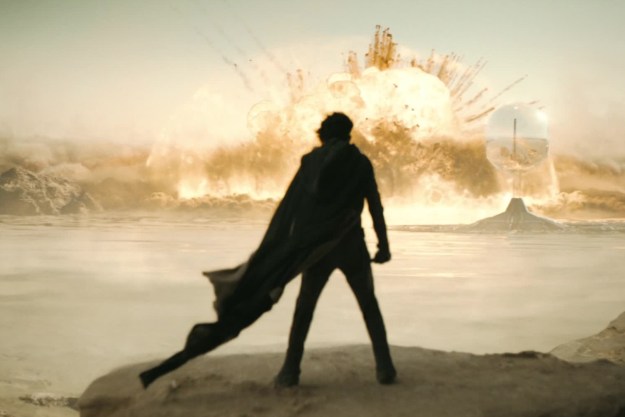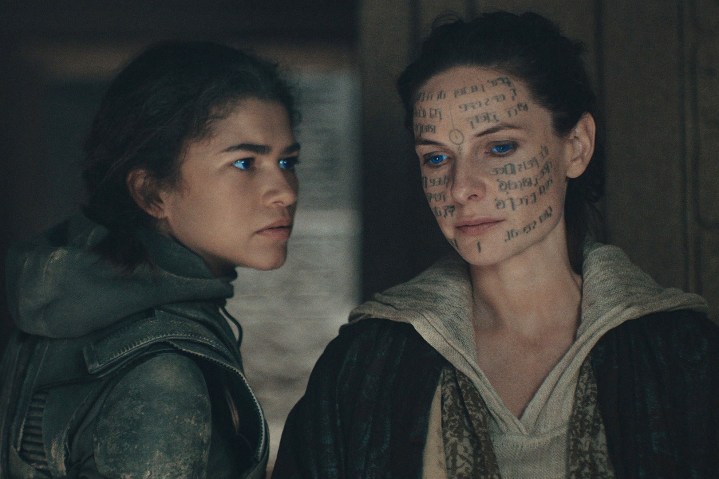
“Dune remains satisfying almost exclusively as spectacle, as something to merely gawk at.”
- Amazing design
- Stunning action
- The setup is behind us
- Still half a movie
- Still a drama of dry feudal intrigue
- Needs more (any) Duncan Idaho
To feel truly transported by a science fiction movie is to find your brain racing to keep up with your eyes, as every frame offers new evidence that you’ve crash-landed somewhere wholly new. That’s the sensation provoked by Dune: Part Two, the closing installment of Denis Villeneuve’s monolithically massive, cleanly cleaved adaptation of the 1965 Frank Herbert novel. Like its predecessor, this is a blockbuster of chiefly cosmetic appeal — a triumph of world-building whose visual imagination extends from the biggest details of its brutalist production design (giant ships, giant buildings) to the smallest props.
Just look at the helmets. Josh Brolin’s spaceman-spiffy astronaut gear. The top piece of an army’s beetle-black armor, complete with doodad whirring in the back. The crescent-moon demon horns sported by a colosseum’s staff, a company-issue uniform extravagant enough to get the flashbulbs bursting at the Met Gala. If one needed further evidence that Dune was laser-gunning to supplant Star Wars in the public imagination — to steal the title of America’s reigning space opera from the franchise its source material helped inspire — the sheer variety of Mandalorian-shaming headwear will do the trick. Mighty statues should be built in costume designer Jacqueline West’s honor.

Watching Dune: Part Two, there’s little denying that Villeneuve, the Québécois art house auteur gone full Hollywood hitmaker, has tamed the unruly deserts of Arrakis. He’s done what Alejandro Jodorowsky and David Lynch couldn’t, and converted a supposedly unfilmable cult object into a popular, populist entertainment — a humungous moviegoing event for the multiplex masses. Yet, his Dune remains satisfying almost exclusively as spectacle, as something to merely gawk at. Its effect is rather crushingly narcotic, an awe numbed by the dry, plodding feudal intrigue of Herbert’s story. Who knew it was possible to be so amazed and so bored at the same time?
Give Part Two this: It’s more nimble and exciting than Part One. Slicing the 800-plus-page story in two was probably the only way to faithfully and coherently bring it to the screen. (Lynch’s 1984 Dune, which covered the whole book in just over two hours, wasn’t exactly a model of narrative sense.) But Villeneuve’s approach resulted in a prelude of a blockbuster, a glorified opening act that devoted most of its 155 minutes to table-setting. It existed only to introduce the Tolstoy-scaled cast of characters; the jargon-heavy mythology; and the central location, an inhospitable desert planet whose native people, the Fremen, have been psychologically and physiologically transformed by a natural resource, the mysterious, highly coveted substance known colloquially as spice.
One could spend a whole review recapping the expository events of that inconclusive opening chapter. Villeneuve and co-writer Jon Spaihts waste little time doing so, instead picking up where their “To be continued…” cliffhanger left off, with teenage scion Paul Atreides (Wonka‘s Timothée Chalamet) and his witchy zealot mother, Jessica (Silo‘s Rebecca Ferguson), forced into the arid wilds of Arrakis. They are the lone survivors of an ambush by their sworn political rivals, the Harkonnens — tyrannical mutant aristocrats who have been pillaging the planet and harvesting its spice for decades. To avenge his father, Paul may have to accept his role as the messiah of legend and prophecy, and unite the Fremen around a common cause — the annihilation of their shared enemy.

That’s not the half of it. Dune‘s plot is as dense as a phonebook. But out there in the sand, away from the palace politics of Part One, the story sparks to life a little. There’s an undeniable hook, however familiar, to Paul’s hero journey, which rests on his half-willing assimilation into the native population — a classically involving melodrama that clarifies Avatar as another sci-fi vision born of Herbert’s influence. Some blessed humor pokes its head out of the dirt in the form of Javier Bardem’s tribe leader, Stilgar, a skeptic-turned-true believer whose enthusiastic cheerleading is an oasis of levity in a desert of poker-faced prophecy. And though Zendaya’s performance as Fremen warrior Chani, the woman of Paul’s premonitory dreams, has a distinctly contemporary cadence — is it possible for a film set eons in the future to seem anachronistic? — the puppy-love courtship lends a welcome human dimension to this stone-tablet material.
For all its state-of-the-art effects work, Dune: Part Two has the scale and grandeur — even the slightly pokier pace — of an Old Hollywood epic. Some of that comes down to its star-studded cast, the kind that used to fill out Biblical and disaster movies. As if to compensate for the big names lost in Part One’s midway-mark massacre, Villeneuve floods the margins with new characters, like the galactic emperor (Christopher Walken, silent for half his time on-screen, as if fearful his famous, much-imitated dialect will spoil the otherworldly verisimilitude) and his daughter, Princess Irulan (Chalamet’s Little Woman costar, Florence Pugh). And joining the prosthetically burdened Harkonnen clan is Elvis star Austin Butler, whose pasty Game of Thrones-grade sadist Feyd-Rautha adds a touch of agreeably campy villainy to the proceedings. He gets a great entrance, a rigged gladiatorial showdown shot in ghostly black-and-white. But the film might have introduced him sooner than halfway through this long sit.

Herbert conceived Dune as an allegorical vision of the Middle East, ravaged by oil-hungry invaders. On-screen, it remains an uneasy mess of contradictions: a critique of colonialism that bends all too easily into the shape of a white-savior story, a kind of deep-space Lawrence of Arabia. Villeneuve complicates that popular reading in tangible ways, making Chani a spokeswoman for a hypothetical audience’s objections — she’s the secular voice of reason here, explicitly calling out the way the Bene Gesserit dogma can be used to control and exploit the Fremen — while emphasizing Paul’s nagging doubts and the insidious manipulation of Jessica’s conversion campaign. (As in Doctor Sleep, Ferguson’s regal, classical beauty gains a mystical predatory quality.) On the other hand, there’s something rather colonialist about how these Dunes populate a world symbolically Arab in dress and language with non-Arab actors. And that’s to say nothing of the accidental real-world echoes of an adventure that pits an oppressive occupation against a revolutionary jihad.
Even those uncomfortable with the optics of Dune may fall under the sway of Villeneuve’s majestic execution. The action is mythic, coherent, and, above all, heavy: When Paul leads the Fremen in an assault on one of the Harkonnen mining vessels, you feel the weight of the infernally colossal machine in your bones. And when a sandworm of lore rises from the deep, ready to be broken like a stubborn horse by the interloping Paul, the whole auditorium shakes and quivers. The composer, Hans Zimmer, has never found a more perfect visual match for his deafening sonic assaults, the rumbling Dolby bombast that’s become his signature. There may be more expensive or more thrilling Hollywood movies released this year, but don’t expect one more huge.

Still, the director is a frustratingly literal dream weaver. He plays Dune impossibly straight, like gospel. That might be one key to the project’s success; after years of irony-poisoned superhero frivolity, the thunderous self-seriousness of this two-part vision holds a certain novelty, an exotic flavor. But sci-fi as unapologetically weird as Herbert’s maybe deserves a more psychedelic interpretation. For all its borderline incoherence, Lynch’s version tapped into the stoner-rock “whoa” factor of Dune. Villeneuve turns the text into left-brain pageantry, a sci-fi movie whose mysteries are all right there on the surface. But what could one expect from the expert craftsman who looked at Blade Runner and decided that the endless replicant debate was where its interest lay?
To Villeneuve, what’s cinematic about Dune is all in the scope and the texture — the opportunity to visualize a vast universe of natural and technological wonders. That the characters, even (or perhaps especially) Chalamet’s Tiger Beat chosen one, have the personality of chess pieces is a bug the filmmaker treats like a feature. Dune may be a foundational classic, but many of the sci-fi adventures it inspired had the good sense to introduce a Han Solo (or at least keep around a Duncan Idaho) to undercut the solemn religious debate and endless jockeying for power. Dune: Part Two doesn’t want to undercut any of that. It’s comfortable playing out a giant game of chess — or, given the bifurcation of Herbert’s hefty story, half a game. At least the board is beautiful.
Dune: Part Two is now playing in theaters everywhere. For more of A.A. Dowd’s writing, visit his Authory page.



